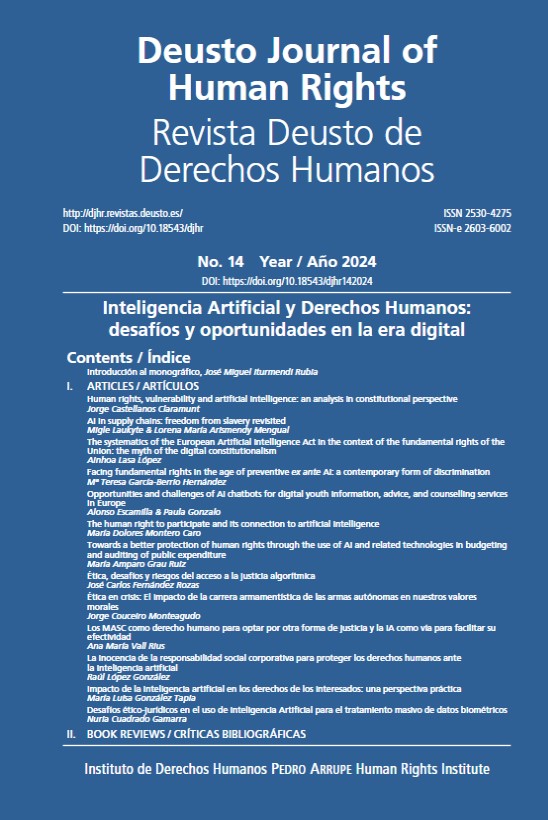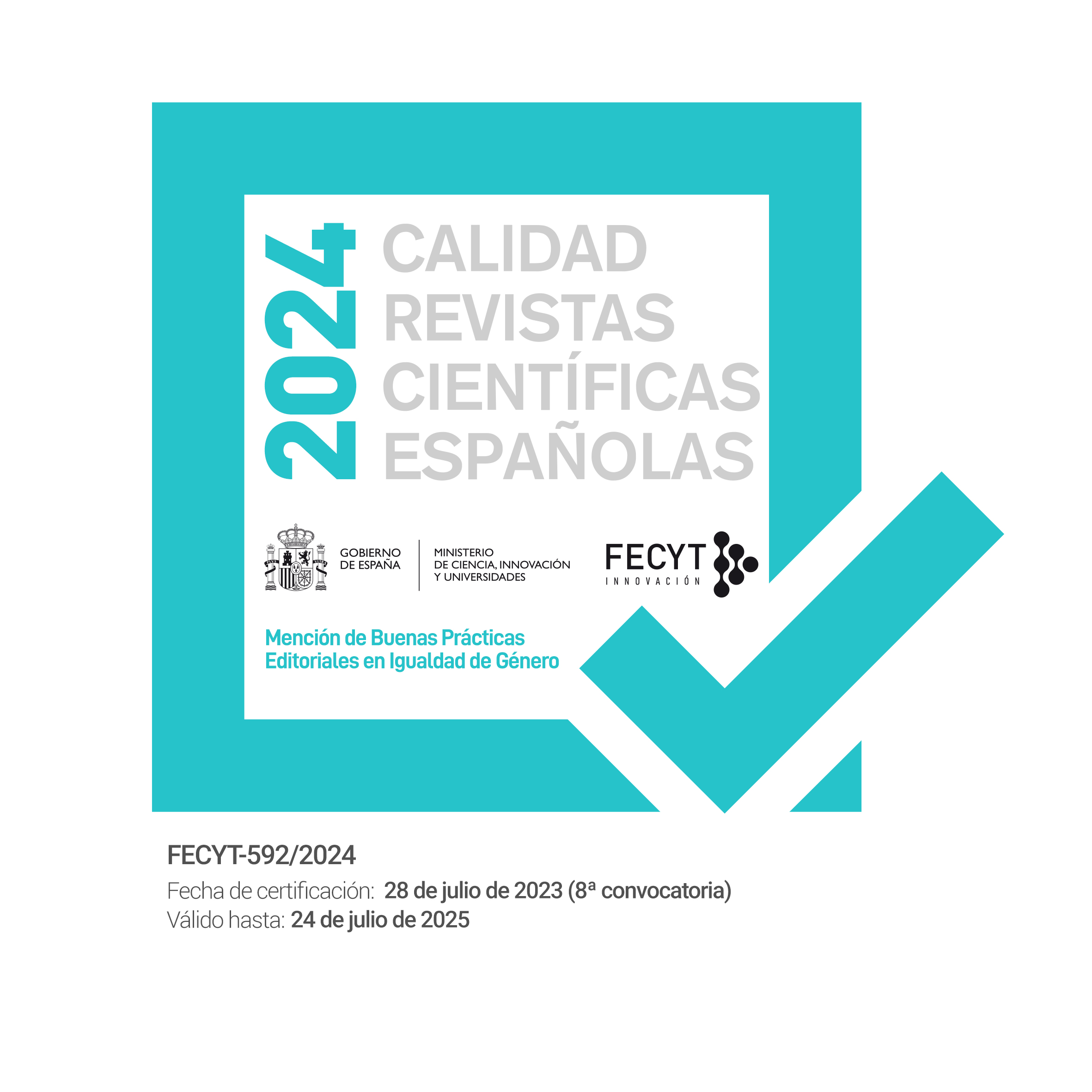The systematics of the European Artificial Intelligence Act in the context of the fundamental rights of the Union: the myth of the digital constitutionalism
Abstract
In recent years, Artificial Intelligence (AI) bases on data driven and machine learning have been at the centre of debates on the implications of certain uses of this technology on fundamental rights in terms of individual and social risks. At the national level, reflections on whether or not AI systems have their own ontological determinism seem to have come up against the obstacles of the staticity of constitutional frameworks that are still analogical. In the European legal order, the most disruptive digital effects of the so-called knowledge economy on the subject and his or her rights seem to be conditioned by the telos of the centrality of the human being in his/her objective-axial dimension (guarantee of the Union’s values) and subjective dimension (protection of the Union’s fundamental rights). The European Union Artificial Intelligence Act would be its most recent legal-normative concretisation, in line with other norms of secondary law that would outline the dynamics of the so-called digital constitutionalism.
Received: 28 May 2024
Accepted: 12 September 2024
Downloads
References
Balaguer, Francisco. 2022. La Constitución del algoritmo. Zaragoza: Fundación Manuel Giménez Abad.
Balaguer, Francisco, and María Luisa Balaguer. 2023. Verdad e interpretación en la sociedad digital. Pamplona: Aranzadi.
Berardi, Franco-Bifo. 2021. La congiunzione. Roma: Nero.
Betancourt, Michael. 2015. The critique of digital capitalism: an analysis of the political economy of digital culture and technology. New York: Punctum Books.
Bilbao, Juan María. 2017. «La consolidación dogmática y jurisprudencial de la drittwirkung: una visión de conjunto». Anuario de la Facultad de Derecho de la Universidad Autónoma de Madrid 1: 41-74.
Bradford, Anu. 2023. Digital empires. The global battle to regulate technology. New York: Oxford University Press.
Castellanos, Jorge. 2023. «Sobre los desafíos constitucionales ante el avance de la Inteligencia Artificial. Una perspectiva nacional y comparada». Revista de Derecho Político 118: 261-287.
Castellanos, Jorge. 2024. «Una reflexión acerca de la influencia de la inteligencia artificial en los derechos fundamentales». In Ciencia de datos y perspectivas de inteligencia artificial, edited by Francisca Ramón, 271-300. Valencia: Tirant Lo Blanch.
Chiariti, Massimo. 2021. Incoscienza artificiale. Come fanno le macchine a prevedere per noi. Roma: Luis University Press.
Crawford, Kate. 2023. Atlas de la IA. Barcelona: Ned Ediciones.
Cristiniani, Nello. 2023. La Scorciatoia. Come le macchine sono diventate intelligenti senza pensare in modo. Bologna: Il Mulino.
De Cabo, Carlos. 2001. «El sujeto y sus derechos», Teoría y Realidad Constitucional 7: 117-136.
De Cabo, Carlos. 1993. Teoría histórica del Estado y del Derecho Constitucional. Vol. II. En Estado y derecho en la transición al capitalismo y en su evolución: el desarrollo constitucional. Barcelona: PPU.
De Gregorio, Giovanni. 2023. «The normative power of artificial intelligence», Indiana Journal of Global Legal Studies 55: 1-26.
De Gregorio, Giovanni. 2022. Digital constitutionalism in Europe. Reframing rights and powers in the algorithmic society. Cambridge: Cambridge University Press.
Demichelis, Lelio. 2018. «Ordoliberalismo 2.0 e ordopopulismo». Economia e Politica. Rivista online di critica della economica politica. Accessed March 23, 2024. https://www.economiaepolitica.it/_pdfs/pdf-8629.pdf.
Esteve, José, and Javier Tejada. 2013. Ciencia y derecho: la nueva división de poderes. Madrid: Fundación Coloquio Jurídico Europeo.
Eubanks, Virginia. 2021. La automatización de la desigualdad. Herramientas de la tecnología avanzada para supervisar y castigar a los pobres. Madrid: Capitán Swing.
Farrand, Benjamin. 2022. «The ordoliberal internet? Continuity and change in the EU’s approach to the governance of cyberspace». European Law Open 2: 106–127.
Finelli, Roberto. 2022. Filosofia e tecnologia. Una via di uscita dalla mente digitale. Torino: Rosenberg & Sellier.
Floridi, Luciano. 2017. La quarta rivoluzione. Come l’infosfera sta trasformando il mondo. Milano: Raffaello Cortina Editore.
García Herrera, Miguel Ángel. 2021. «Neoliberalismo y estado económico». In Crisis de la constitución: globalización neoliberal e integración europea, edited by Gonzalo Maestro et al., 39-135. Granada: Comares.
García Herrera, Miguel Ángel. 2015. «Estado económico y capitalismo financiarizado: propuestas para un constitucionalismo crítico». In Constitucionalismo crítico. Liber amicorum Carlos de Cabo Martín, edited by Miguel Ángel García Herrera et al., 137-242. Valencia: Tirant Lo Blanch.
García Herrera, Miguel Ángel. 2022. «Estado y soberanía en la nueva fase de acumulación: entre crisis de la integración europea y la reconstrucción del espacio global». In La refundación de la Unión Europea y la nueva centralidad estatal, edited by Ainhoa Lasa, Miguel Ángel García Herrera and Gonzalo Maestro, 225-276. Valencia: Tirant Lo Blanch.
Han, Byung-Chul. 2014. En el enjambre. Barcelona: Herder.
Kolev, Stefan, and Nils Goldschmidt. 2022.«Vitalpolitik». In The Oxford Handbook of Ordoliberalism, edited by Thomas Biebricher, Peter Nedergaard, Werner Bonefeld, 453–460, Oxford: Oxford University Press.
Lanier, Jaron. 2013. Who owns the future? New York: Simon & Schuster.
Maestro, Gonzalo. 2022. «Las precondiciones para la recuperación del espacio constitucional estatal». In La refundación de la Unión Europea y la nueva centralidad estatal, edited by Ainhoa Lasa, Miguel Ángel García Herrera, and Gonzalo Maestro, 176-185. Valencia: Tirant Lo Blanch.
Maestro, Gonzalo. 2017. «El Estado Social 40 años después: la desconstitucionalización del programa constitucional». Revista de Derecho Político 100: 769-798.
Maestro, Gonzalo. 2015. «Del estado social a la forma global de mercado». In Constitucionalismo crítico. Liber amicorum Carlos de Cabo Martín, edited by Miguel Ángel García Herrera et al., 53-94. Valencia: Tirant Lo Blanch.
Maestro, Gonzalo. 2011. «La globalización americana». Teoria del diritto e dello Stato. Rivista Europea di Cultura e Scienza Giuridica 1-2: 165-187.
Mitchell, Melanie. 2024. Inteligencia artificial. Madrid: Capitán Swing.
Morozov, Evgeny. 2022. «Critique of techno-feudal reason». New Left Review 133/134: 89-126.
Numerico, Teresa. 2021. Big data e algoritmi. Prospettive critiche. Roma: Carocci.
Pašukanis, Evgeny V. 1976. Teoría General del derecho y marxismo. Barcelona: Labor Universitaria.
Presno, Miguel Ángel. 2022. Derechos fundamentales e inteligencia artificial. Madrid: Marcial Pons.
Reche, Nuria. 2024. Mens Iura Fundamentalia: La neurotecnología ante la Constitución. A Coruña: Colex.
Rifkin, Jeremy. 2001. The age of access: the new culture of hypercapitalism where all of life is a paid-for experience. Los Angeles: TarcherPerigee.
Simoncini, Andrea, and Elia Cremona. 2022. «La AI fra pubblico e privato». DPCE Online 51 (1): 253-271.
Simoncini, Andrea, and Erik Longo. 2022. «Fundamental rights and the rule of law in the algorithmic society». In Constitutional challenges in the algorithmic society, edited by Hans-W. Micklitz et al., 27-41. Cambridge: Cambridge University Press.
Terzis, Petros. 2024. «Against digital constitutionalism», European Law Open, 1-17. https://doi.org/10.1017/elo.2024.15.
Van Cleynenbreugel, Pieter. 2022. «EU by-design regulation in the algorithmic society: A promising way forward or constitutional nightmare in the making?». In Constitutional challenges in the algorithmic society, edited by Hans-W. Micklitz et al., 202-218. Cambridge: Cambridge University Press.
Zuboff, Shoshana. 2020. La era del capitalismo de la vigilancia. La lucha por un futuro humano frente a las nuevas fronteras del poder. Barcelona: Paidós.
Deusto Journal of Human Rights / Revista Deusto de Derechos Humanos is an Open Access journal; which means that it is free for full and immediate access, reading, search, download, distribution, and reuse in any medium only for non-commercial purposes and in accordance with any applicable copyright legislation, without prior permission from the copyright holder (University of Deusto) or the author; provided the original work and publication source are properly cited (Issue number, year, pages and DOI if applicable) and any changes to the original are clearly indicated. Any other use of its content in any medium or format, now known or developed in the future, requires prior written permission of the copyright holder.



3.jpg)
3.jpg)
3.jpg)
.jpg)








